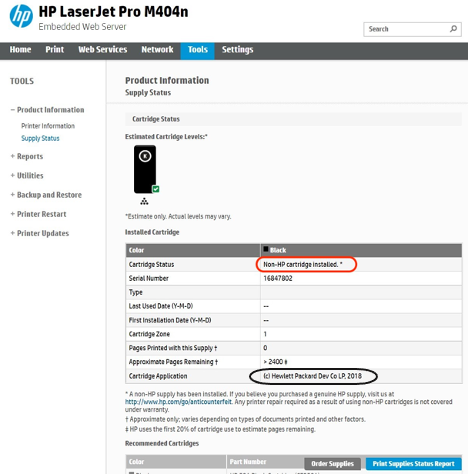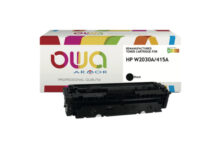In monitoring Amazon Standard Identification Numbers (ASINs) in Europe and the United States, it appeared to Actionable Intelligence analysts that certain listings featuring third-party toner cartridges for HP LaserJet-branded devices had been removed. When we checked with various manufacturers to confirm our observations, several firms told us they were unaware of any takedowns; however, representatives at HP confirmed that dozens of third-party toner cartridge brands offered for sale on Amazon in the European Union and the United States had been removed because the cartridges employed integrated circuits that violate HP’s intellectual property (IP).
According to our sources, the takedowns happened late in 2022 after HP purchased and tested over 250 third-party toner cartridges and found most of the samples featured chips that violate HP’s copyright and trademark protections. It appears that all of the infringing chips have originated at the same source—Ninestar’s chip subsidiary, Geehy Microelectronics, which until recently was known as Apex Microelectronics (see “Apex Microelectronics Is Now Geehy Microelectronics”).
The IP Violation
Canon supplies HP with LaserJet hardware and supplies and holds most of the patents covering inventions deployed in these products. The Japanese firm is diligent in its protection of these patents and has filed—and won—a number of lawsuits accusing companies of having encroached on its patents. Canon also works with Amazon and regularly has the platform remove third-party toner cartridges for LaserJet devices that infringe its patents.
While Canon holds the patents on LaserJet hardware and supplies, HP has copyrighted code used in these products. This code allows for communication between the supplies and the hardware and supports various functions. For example, HP’s code gathers the cartridge information that’s available on a machine’s supplies status page and Embedded Web Server (EWS) page. In addition to being copyrighted, the OEM’s code references “HP” as a registered trademark, which is also protected IP.
Like the OEM chips, third-party chips for non-HP LaserJet supplies also use code to identify the consumables being used. When written properly, the code in third-party chips will communicate to the printer that the installed cartridge is a non-OEM product, which is displayed on the machine’s supplies status page or its EWS page (see images below). Third-party code can also be written to misidentify the cartridge it supports as a genuine HP product. In so doing, the third-party chip violates HP’s trademark and copyrighted code as well as deceives end users.
In our two EWS-page examples below, the information circled in red does not violate HP’s IP in any way. However, at the bottom of EWS page, the information circled in black violates HP’s trademark and copyright. We were informed that the use of the term “© Hewlett Packard Dev CO LP, 2018” was unauthorized. The code used to render the information was also directly copied from HP chips, which is another violation of HP’s copyright.
HP has grown increasingly active in getting products that violate its IP off Amazon. In August 2022, Guillaume Gerardin, senior vice president and general manager of print supplies for HP, told Actionable Intelligence that his company has been detecting more infringing products—especially online—since the COVID-19 pandemic. In the first half of fiscal 2022, HP assisted in the seizure of some 2.6 million counterfeits (see “Head of HP Supplies Says Counterfeit Seizures Soared in H1 2022”).
In addition to all the fakes, HP has cracked down on firms infringing IP related to its toner cartridges. Last year, the OEM found that several Aster Graphics subsidiaries were marketing compatible Samsung monochrome toner cartridges that violated HP’s patents (see “After Hearing from HP, Aster Pulls Infringing Samsung SKUs Off European Market”). Aster pulled the cartridges from the market after being notified that the OEM discovered that 10 of Aster’s Samsung-compatible toner cartridges violated HP’s European patents. HP recently filed suit in U.S. District Court for the Northern District of California against 11 defendants alleging they engaged in trade dress infringement, false advertising, unfair competition, and deceptive trade practices when selling on several online marketplaces including Amazon, Walmart, Newegg, and Temu (see “HP Sues Third-Party Cartridge Sellers over Lookalike Trade Dress”).
The Takedowns
We were told that before HP initiated the takedowns last year, it purchased and examined products from various Amazon vendors to confirm infringement. The OEM sampled third-party versions of the following HP cartridge models, most of which were introduced in 2019 (see “HP Updates LaserJet 400, 500, 600 Series”):
- the HP 58A (CF258A) and HP 58X (CF258X), which are black toner cartridges sold in the Americas for the LaserJet Pro M404 and LaserJet Pro MFP 428 series;
- the HP 59A (CF259A) and HP 59X (CF259X), which are black toner cartridges sold in Europe for the LaserJet Pro M404 and LaserJet Pro MFP 428 series;
- the HP 414A (W2020A) and HP 414X (W2020X), which are the black toner cartridges sold in the Americas for the HP Color LaserJet Pro M454 and Color LaserJet Pro MFP M479 series; and
- the HP 415A series (W2030A, W2031A, W2032A, and W2033A) and the HP 415X series (W2030X, W2031X, W2032X, and W2033X) black, cyan, magenta, and yellow toner cartridges sold in Europe for the HP Color LaserJet Pro M454 and Color LaserJet Pro MFP M479 series.
Our HP sources said that while some of the third-party LaserJet cartridges that were examined used original HP chips harvested from spent OEM cartridges, many of the samples employed clone chips that violated HP copyrighted code and IP. After identifying the offending cartridges with the alleged infringing code, the company then searched for the products being sold on Amazon in the United States and nine different European countries. In total, HP discovered 527 listings linked to 115 unique Amazon Standard Identification Numbers (ASINs) featuring the infringing cartridges. The listings included instances of the products bundled in multipacks along with ASINs that appeared in more than one country.
According to our sources, HP notified Amazon of the infringing products in October, and most of the listings of cartridges with infringing chips were taken off the platform. We understand that Amazon did not remove approximately 30 listings that HP claimed were infringing. As of this writing the status of some of these listings remained under review. Although HP didn’t offer many details about the ASINs that were allowed to remain, the representatives we spoke with said most of the challenges came from companies selling the products in question in the United States. They also indicated that additional takedowns may occur.
The Geehy/Apex Connection
HP representatives told us that subsequent to testing the various cartridge samples in the LaserJet devices and discovering the deceptive messaging, the chips on the infringing cartridges were physically inspected. It was after examining the chips and comparing them side-by-side that HP concluded they were all from Ninestar’s Geehy/Apex subsidiary.
The chip samples were taken from cartridges with well-known brands associated with Ninestar, such as G&G, Lemero, Xerox, and others. G&G, for example, is marketed exclusively by Ninestar under its own name worldwide, and in its financial filings, Ninestar has indicated it operates Lemero subsidiaries in the Americas and in Europe. While Xerox may have more than one source for the products marketed under its Everyday Toner brand, it is widely held that Ninestar or its subsidiaries are among the copier manufacturer’s primary suppliers for the line. Chips were also sampled from some of the third-party cartridges with obscure brands like Donkey in Europe and Hotoink in the United States.
Regardless of the brand, a visual inspection of the third-party chips taken from the cartridge samples revealed that all of the chips were identical. HP representatives told us that even the code on the exterior of the chips was the same. In addition, according to our sources, at the time the cartridges were purchased, Geehy/Apex was the only firm marketing chips for third-party cartridges used in the HP machines listed above.
Widely Available Infringing Chips
We were surprised by the rampant use of chips that deliver misleading messages and thereby violate HP’s IP given the attention that the OEM has paid to the problem. Beginning in 2013, HP started warning chipmakers about the perils of violating its copyrighted code and HP trademark (see “Chips Ahoy! HP Releases More Details about New Chip Program”). To instruct the third-party chip industry on how to avoid getting into legal hot water, the OEM offers a white paper titled Aftermarket Chips for HP LaserJet Printers: Recommended Changes to Avoid Brand Misidentification. After the release of the white paper, many leading chip vendors in Europe and the United States, including Delacamp and Static Control Components, released statements indicating they planned to comply with HP’s instructions. A number of third-party cartridge manufacturers also said they would make sure the chips used on LaserJet remanufactured and new-build compatibles cartridges respected HP’s IP.
Unfortunately, the recent removal of hundreds of listings for third-party LaserJet cartridges from Amazon makes it clear that there is currently an ample supply of third-party chips that ignore HP’s IP. Moreover, the use of these infringing chips is widespread in the world’s two largest consumables markets, the European Union and the United States. We suspect the same is true in other markets.
We have written many times on this website about the wide availability of fake or deceptive products and how these products harm OEMs and third-party supplies vendors that play by the rules. There is no doubt that infringing chips threaten the entire imaging supplies market.
Each year, OEMs and legitimate third-party supplies vendors lose billions of dollars in sales to infringing products. This is apparent in all the Amazon takedowns seen across the industry along with the successful IP lawsuits and seizures of large quantities of counterfeits. Trade groups like the European Toner & Inkjet Remanufacturers Association (ETIRA), the Imaging Consumables Coalition of Europe, Middle East, and Africa (ICCE), the Imaging Supplies Coalition (ISC), and others are actively working to level the competitive playing field around the world and rid the global market of fake and infringing products. Over the past few months, the International Imaging Technology Council (Int’l ITC) has exposed a number of deceptive practices used by Chinese manufacturers exporting cartridges to the United States (see “Int’l ITC Says It Sees False Advertising Practices for Third-Party Inkjet Cartridges on Amazon,” “Int’l ITC Video Exposes Online Seller Marketing New-Build Cartridges as Remanufactured,” and “Int’l ITC Finds Another Example of New-Builds Being Sold as Reman on Amazon”).
After HP’s successful Amazon takedowns, we expect that the groups noted above and others to pay more attention to the IP wrapped around third-party chips. Despite all the effort from OEMs and trade organizations, it is obvious that unfair and deceptive business practices continue, and much of this harmful activity would be eliminated if vendors did not have access to infringing chips. As competitors fight for share in a declining market, it is clear that IP holders will continue to take action to protect their rights. It is thus incumbent on manufacturers to respect IP and on cartridge resellers to educate themselves about IP issues surrounding what they sell and or they run the risk of facing online takedowns and litigation.
Download this article as a PDF.









